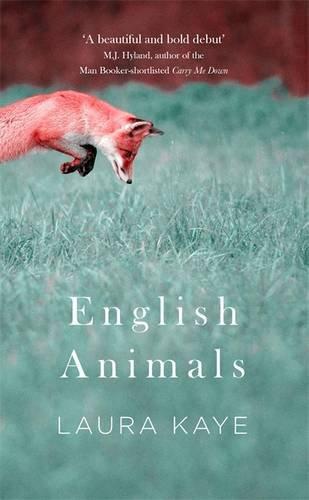 Last week was boom time on the blog with reports from the London Book Fair and a George Saunders event – now it’s back to featuring authors from my Spring Sofa Spotlight. As you may recall, I was struck by how many of my chosen titles had important things to say about the world right now. This might not appear that strange, considering my main interest is contemporary fiction; what is strange is that the authors of three of the seven could not have predicted the significance they would acquire in the light of subsequent events.
Last week was boom time on the blog with reports from the London Book Fair and a George Saunders event – now it’s back to featuring authors from my Spring Sofa Spotlight. As you may recall, I was struck by how many of my chosen titles had important things to say about the world right now. This might not appear that strange, considering my main interest is contemporary fiction; what is strange is that the authors of three of the seven could not have predicted the significance they would acquire in the light of subsequent events.
One is Elizabeth Hay’s gorgeous His Whole Life, set against the backdrop of the Quebec Independence referendum of the 1990s, and Elizabeth will be visiting the Sofa in May. Another is Behold the Dreamers by Imbolo Mbue, set at the start of the Obama era, which examines immigration, race and identity in a way that is both uniquely American and global. And today’s featured title, English Animals by debut author Laura Kaye, has extraordinary relevance in the European context, maybe all the more for not having had an issue-based agenda in the making. (Personally I will be giving anything billed as a ‘Brexit novel’ a wide berth.)
I’d love to meet Laura in real life one day as we have a lot in common; we are both linguists (you’ll see), we have similar views on the ‘appropriation’ question, an interest in sexuality as a theme and our debut novels are narrated in first person by characters navigating life in a foreign language and country. Knowing some of the challenges this entails, I was particularly impressed by the way Laura handled them and I’m delighted she is here to tell me how she did it (my review follows):
Long before I started writing English Animals, I had written some scenes involving Sophie, an upper-middle class woman trapped in a toxic marriage, living in the countryside and who was secretly gay. Nothing materialised from these exercises: I started writing other unrelated books. But Sophie remained at the back of my consciousness until one night I met a woman from Eastern Europe who told me the story of how she came to the UK to work on a pheasant shooting estate and ended up having an affair with the wife. I woke up the next morning and knew that this was the book I was going to write. Not only would I be able to touch on the homophobia that I had encountered in this world, but it would also give me a chance to talk about the hatred of the European Union and the xenophobia towards European migrants that I had heard voiced, even years before rumours of a referendum.
At this point it was going to be Sophie’s story. Poor, lonely Sophie whose world is shaken up when Mirka, a young girl from Slovakia, comes to stay at the house, and for whom she starts developing feelings. But something did not sit well for me with this story – Sophie was a self-pitying character who I knew would mistreat Mirka. Mirka in turn would always remain in the book as the Other and eventually go away again. I realised I wanted to write it the other way around – from Mirka’s side.
This made me nervous. Was Mirka’s story mine to tell? What about cultural appropriation? Shouldn’t a story of immigration be left to those who have experienced the turmoil of uprooting their life first hand? Perhaps. But as a novelist I believe sincerely that anyone can write about whatever situations or characters they like – men about women, straight people about gay people and vice versa of course, and this goes for anything, whether it is race, age, nationality or class – but always with sensitivity and due care.
If I was going to write from Mirka’s perspective I had to think about how to do her justice and give her integrity as a character and a voice. The first thing I did was go to the British Library and read a thesis about common mistakes that Eastern European language speakers make in English. After an hour or so I realised that the exercise was futile and I was never going to be able to incorporate these rules into my writing. They were boring, minor technicalities and I decided I did not have to be faithful to them – who knew what mistakes my character might make, or from which sources she had learnt her vocabulary? I could decide how her language came out, what words she knew or didn’t know, and nobody could really argue with me.
I began to set myself some rules, others I figured out along the way. Mirka would speak with a limited vocabulary and always use the simplest word if there were a variety of options. If she did not know the word, then she could use shapes and colours to get around the problem. Having studied languages (Spanish and Portuguese) at university I know what it is like to try and express yourself in a language which is not your own and how frustrating it can be when you can’t be yourself. Quickly though, I saw the potential of this made-up language for defamiliarisation – making the everyday world of the place she finds herself in, a place which is very normal to some people – exotic. It was in those tiny modulations and mistakes where I found potential for strangeness and humour, for example when she says dried hair when she means blow-dried, which gives a different connotation entirely.
One of the rules was that she would not use any idioms. In not allowing Mirka to use any at all, I realised how many we use all the time and how bizarre some of them are. Something as ubiquitous as I held my breath is a phrase we use without thinking, but actually it is quite an odd way to put it. Keep your eyes peeled is one of our strangest ones, I think.
Another concern was that Mirka might come across as less intelligent with her deficient language, while the English people seemed more sophisticated and educated by comparison. I hope she doesn’t – in my mind she comes across as far more intelligent, brave and imaginative than anyone else in the book, which is the point because, in many ways English Animals is more about the shortcomings of the people she encounters. And though there is undoubtedly some affection in the portrayal of those English characters, they are for the most part hypocritical, snobbish, bigoted, manipulative and pompous. There would have undoubtedly have been other ways to have shown this, but I certainly found that forcing myself to write as an outsider laid bare the absurdities of many things I had taken for granted, that borrowing a pair of eyes allowed me to see my own culture in a new light, and that inhabiting a different voice allowed me to express it.
Thank you, Laura, for letting us in on the thinking behind English Animals in this great piece.
Author photo © Charlie Hopkinson

Yesterday I went on a long walk thinking about how to review this book, and I can’t come up with a better way than to flag up the ways in which it succeeds where it could easily not have done. This is the mark of an author willing to take risks (something I admire) and one who is in control of her material. It is no small matter to impose on a narrative the kind of linguistic restrictions Laura describes above* – and for the writing to have such an unlikely ‘fluency without fluency’ is remarkable. Far from being irksome or alienating – for those were the risks – this only strengthens Mirka’s voice and character, also underlining the bizarreness and vulnerability of her situation. I found her an empathetic and endearing protagonist, to the point that I worried for her. Beyond Mirka, the characterisation trades in various caricatures and stereotypes, from rural ‘Little Englanders’ to Dalston hipsters via the eccentric and over-privileged upper-middle class. I imagine most English readers of this novel will recognize some shade of ourselves even if we don’t take a direct hit, and whilst the satire is more gentle than cruel, it requires a steady nerve as a writer to know that you are potentially sending up your target audience. (I’m with Rowan Atkinson, who says, ‘the right to offend is far more important than any right not to be offended’.) Some of the attitudes to Europe and immigration in English Animals have proven to be more widespread than previously assumed – this would always have been a good novel, but Brexit makes it more powerful and discomfiting (if not downright painful) to read. What most distinguishes it for me are the arresting juxtapositions which make it so refreshing and unpredictable: the subtlety of observation alongside the tropes, the seemingly (and yet not) random choice of anthropomorphic taxidermy as a means of throwing everything into sharper relief. This is a serious, intelligent novel in which a lot of unpleasantness – and on occasion, gore – is punctuated with some very sexy, and hilarious moments. Entirely my kind of book.
*(My next novel is again set in Paris but in the perspective of a French character, which rules out extensive use of British/American idioms and cultural references, but cannot depend too heavily on the French equivalents as aimed at English-speaking readership.)
*POSTSCRIPT*
Next week, Louise Walters returns to the Literary Sofa with a piece on handling multiple points of new in her second novel A Life Between Us.
Advertisements
